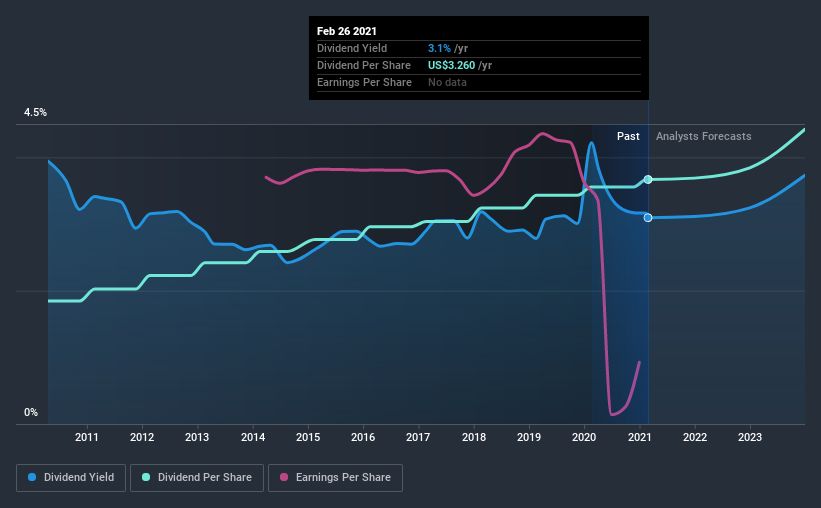Here's Why We're Wary Of Buying Genuine Parts' (NYSE:GPC) For Its Upcoming Dividend
Genuine Parts Company (NYSE:GPC) stock is about to trade ex-dividend in 4 days. Investors can purchase shares before the 4th of March in order to be eligible for this dividend, which will be paid on the 1st of April.
Genuine Parts's next dividend payment will be US$0.81 per share, on the back of last year when the company paid a total of US$3.16 to shareholders. Based on the last year's worth of payments, Genuine Parts has a trailing yield of 3.1% on the current stock price of $105.35. We love seeing companies pay a dividend, but it's also important to be sure that laying the golden eggs isn't going to kill our golden goose! As a result, readers should always check whether Genuine Parts has been able to grow its dividends, or if the dividend might be cut.
Check out our latest analysis for Genuine Parts
Dividends are usually paid out of company profits, so if a company pays out more than it earned then its dividend is usually at greater risk of being cut. An unusually high payout ratio of 279% of its profit suggests something is happening other than the usual distribution of profits to shareholders. That said, even highly profitable companies sometimes might not generate enough cash to pay the dividend, which is why we should always check if the dividend is covered by cash flow. The good news is it paid out just 24% of its free cash flow in the last year.
It's disappointing to see that the dividend was not covered by profits, but cash is more important from a dividend sustainability perspective, and Genuine Parts fortunately did generate enough cash to fund its dividend. Still, if the company repeatedly paid a dividend greater than its profits, we'd be concerned. Very few companies are able to sustainably pay dividends larger than their reported earnings.
Click here to see the company's payout ratio, plus analyst estimates of its future dividends.
Have Earnings And Dividends Been Growing?
Companies with falling earnings are riskier for dividend shareholders. If earnings decline and the company is forced to cut its dividend, investors could watch the value of their investment go up in smoke. With that in mind, we're discomforted by Genuine Parts's 25% per annum decline in earnings in the past five years. When earnings per share fall, the maximum amount of dividends that can be paid also falls.
The main way most investors will assess a company's dividend prospects is by checking the historical rate of dividend growth. Genuine Parts has delivered 7.1% dividend growth per year on average over the past 10 years. That's intriguing, but the combination of growing dividends despite declining earnings can typically only be achieved by paying out a larger percentage of profits. Genuine Parts is already paying out a high percentage of its income, so without earnings growth, we're doubtful of whether this dividend will grow much in the future.
Final Takeaway
From a dividend perspective, should investors buy or avoid Genuine Parts? It's not a great combination to see a company with earnings in decline and paying out 279% of its profits, which could imply the dividend may be at risk of being cut in the future. However, the cash payout ratio was much lower - good news from a dividend perspective - which makes us wonder why there is such a mis-match between income and cashflow. Bottom line: Genuine Parts has some unfortunate characteristics that we think could lead to sub-optimal outcomes for dividend investors.
Although, if you're still interested in Genuine Parts and want to know more, you'll find it very useful to know what risks this stock faces. Our analysis shows 4 warning signs for Genuine Parts and you should be aware of these before buying any shares.
If you're in the market for dividend stocks, we recommend checking our list of top dividend stocks with a greater than 2% yield and an upcoming dividend.
This article by Simply Wall St is general in nature. It does not constitute a recommendation to buy or sell any stock, and does not take account of your objectives, or your financial situation. We aim to bring you long-term focused analysis driven by fundamental data. Note that our analysis may not factor in the latest price-sensitive company announcements or qualitative material. Simply Wall St has no position in any stocks mentioned.
Have feedback on this article? Concerned about the content? Get in touch with us directly. Alternatively, email editorial-team (at) simplywallst.com.

